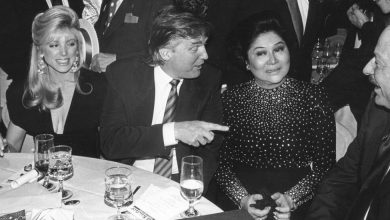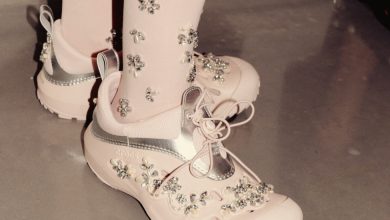John Mulaney Punctures His Persona in ‘Baby J’

In his new special, “Baby J,” we hear John Mulaney before we see him.
“In the past couple years, I’ve done a lot of work on myself,” says one of the most distinctive voices in comedy, as a black screen transitions into an empty backdrop of a stage. “And I’ve realized that I’ll be fine as long as I get constant attention.”
Then in a glamorous, swirling shot orchestrated by the theater director Alex Timbers, the camera gives the comic what he needs. It retreats to reveal Mulaney, 40, in a maroon suit, before circling to give us a picture of the commanding power of stardom. Shot from behind, we see his perspective: a hazy mass of people underneath chandeliers in between an ominous series of statues inside the Symphony Hall in Boston.
It’s a striking image setting up a series of bristling comic vignettes that dig into Mulaney’s drug addiction, intervention by friends and stint in rehab. One is tempted to say this is his most personal work, but that isn’t quite right. That first shot tips us off to a theme: You can be invisible in front of a crowd. Mulaney’s comedy, however, has become spikier, pricklier, sometimes slower while remaining as funny as ever, like he’s a pitcher who learned to mix up speeds. He has performed versions of this material throughout the last two years, and this special arrives on Netflix so meticulously honed that the polish doesn’t even show.
At some point in the last decade, John Mulaney stopped being merely a very successful comedian and transformed into something larger in the culture: the boyish sweetheart in a scene full of creeps, the wife guy who doesn’t need children to be happy, the aspirational theater kid. I didn’t grasp this shift until, in a short period of time, he checked into rehab, got a very public divorce, and had a child with the actress Olivia Munn. Judging by the reaction online, not to mention the texts on my phone, people had feelings about this — lots of them. Mulaney made the word “parasocial” go mainstream.
For comics, being in the news like this can be tricky terrain, both a problem and an opportunity. “Likability is a jail,” Mulaney says at one point in “Baby J,” and his self-deprecating punch lines about his own vanity could be viewed as a prison break. He recalls that when he was young, he would feel jealousy toward the kid who had suddenly become the focus of his classmates’ sympathies when his grandfather died. “Did you ever, like me, hope …” he says, abruptly pausing his cadence to let the audience anticipate his embarrassing thoughts about the possible benefits of the death of grandparents.
Mulaney has always spoken at a rapid if precise clip, heavily influenced by Spalding Gray, the pioneering confessional monologuist. (“If story rhythms were legally protected like song hooks, I would be in prison,” Mulaney once tweeted about Gray.) Mulaney’s rat-a-tat-tat delivery demanded you keep up with his thought process. It still does, but his cadence has become more intricate, and the biggest laughs in this new special come from making the audience think they are ahead of him, placing an idea in their head, then slowing down to a pause or stammer to let it percolate.
This tactic requires patience and deft timing but can produce an intense response, the comedy equivalent of letting you hear the scratching under the bed while postponing the reveal of the monster long enough to let your imagination run amok.
The stories he tells here present a desperate man, including one about a very sketchy doctor who gives him prescription drugs in exchange for some low-level deception and the removal of his shirt. Mulaney has such a chipper affect that he can put across grim material without weighing the show down, a superpower these days when ambitious comics are often expected to do more than tell jokes.
His description of his intervention is a comic highlight, with act-outs of Nick Kroll and Fred Armisen. He’s hilariously flattered by the intervention’s star-studded attendance, “a ‘We Are the World’ of alternative comedians over the age of 40.” And when the woman running it says that she heard he was nice, he corrects her: “Don’t trust the persona.”
The funniest part of the special, which at over an hour and 20 minutes is longer than most released by Netflix these days, is an elaborate description of a text he got in rehab from Pete Davidson that a nurse woke up him to read. “Some people suggested we did drugs together because he has tattoos and I am plain,” Mulaney says, a gentle poke at the shallowness of the media and public.
This story takes off when we learn that Mulaney had put Davidson’s number in his phone under the name Al Pacino, which gives Mulaney a chance to perform the scene a second time from the nurse’s perspective, including an amazing impersonation of late-era Pacino. I can’t do this justice, except to say that the phrase “daddy khaki pants” made me laugh out loud.
Silliness has long been central to Mulaney’s humor, and part of it comes from the incongruity of his seeming either younger than his age or much older (he favors archaic words like “nay” instead of “no”). The titles of his specials tell a Benjamin Button story: “New in Town,” followed by “The Comeback Kid” and “Kid Gorgeous,” followed by “Baby J.” The way it’s going, “Fetal Position” could be next.
This is a highly anticipated special, and the modern stand-up event tends to be about something more messy than jokes. When Jerrod Carmichael came out of the closet, he ended his special abruptly, with loose ends; Chris Rock flashed raw emotion in his vengeful response to being slapped by Will Smith. Mulaney remains a tightly controlled performer. His special mostly avoids his divorce and new child, focusing instead on his drug addiction.
That story has a happy ending, with him going to rehab and emerging not only sober, but also no longer needing the approval of others. It’s a dramatic, abrupt evolution. “What is someone going to do to me that’s worse than what I would do to myself?” he asks, hinting at his own self-destructive tendencies. “What, are you going to cancel John Mulaney? I’ll kill him.”
That’s not the Mulaney his fans thought they knew. But it’s worth noting that if you revisit his first special from 2012, you’ll find a story about lying to a doctor to get drugs (Xanax in that case) as well as a confession that he had a drinking problem that started when he was 13 that he had since kicked.
How much has changed with him is something we can never truly know. But we, the audience, can be naïve about our entertainers. We assume we understand them, and when they do something at odds with their persona, we feel betrayed, even angry. Yet no one ever asks us to take accountability for getting it wrong. You would think by now we would approach show business with a little more skepticism. But the truth is that we don’t want to, and great performers intuitively understand that. They’re gifted at creating intimacy with the viewer, at making us believe.
John Mulaney appears to have become, as many veteran comics do, more cynical about this relationship, and speaks to it after relating an anecdote that makes him look bad. “As you process and digest how obnoxious, wasteful and unlikable that story is, just remember,” he says, eyes glassy, “that’s one I’m willing to tell you.”
This suggests he has done even more unlikable things, but also that whatever you might think, you don’t really know him. An artist who respects his audience less would state this directly. John Mulaney lets the mind wander.




